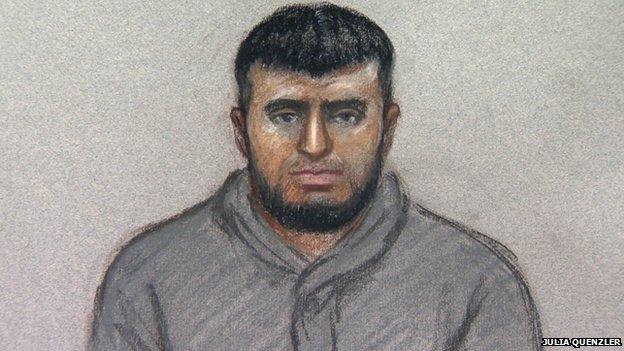British Jihadist who faked death admits terror offences
- Published
Daniel Sandford reports on the jihadist who faked his death
A British jihadist who spent six months in Syria and faked his death in an attempt to return to the UK undetected has admitted four terrorism offences.
Imran Khawaja, from Hounslow, west London, posed with a severed head before trying to re-enter the UK.
The 27-year-old admitted preparing for acts of terrorism, attending a camp, receiving training and possessing firearms in a hearing last year.
Legal restrictions have been lifted to allow reporting of his guilty pleas.
Propaganda drives
Khawaja spent the first six months of last year in Syria alongside jihadist fighters, the Old Bailey heard.
Police say that his group were involved in major propaganda drives to attract other recruits and were also involved in serious violence.
In one image, Khawaja is seen holding a severed head taken out of a bag - although he masked his face to try to avoid detection.
Khawaja, who joined other Britons in the conflict, later used a social media account to announce his death during fighting.
Police believe this was an attempt to sneak back into the UK unseen.
His cousin Tahir Bhatti, 44, from Watford, helped Khawaja to return to the UK by driving him from Bulgaria in June 2014, but the pair were arrested by police officers waiting for them at Dover.
Bhatti, a taxi driver, pleaded guilty to assisting an offender. He has previously pleaded not guilty to preparing a terrorist act by helping Khawaja, having information about terrorism, and assisting an offender.
Another man, Asim Ali, pleaded guilty to entering into a funding arrangement for the purposes of terrorism.

Imran Khawaja in the dock at the Old Bailey last month
The 33-year-old from Ealing, west London, admitted making £300 available to Khawaja while knowing, or having reason to suspect, it might be used for the purposes of terrorism.
Ali denied another charge of preparing a terrorist act between January and June 2014.
Khawaja originally faced a further charge of soliciting to murder - but that is now to lie on file, along with the other outstanding charges, the Old Bailey heard.
'Dangerous man'
His guilty pleas can now be reported after his co-defendants admitted terror charges and the prosecution decided not to pursue a trial.
The three men will be sentenced next month. Khawaja faces a possible prison term of up to life imprisonment.
Commander Richard Walton, head of the Met's Counter Terrorism Command, said: "Imran Khawaja was not a vulnerable teenager that has travelled out to Syria and been coerced to travel to Syria.
"This is a man who has chosen the path of terrorism. We don't know why he came back. We don't know what he was planning.
"But this is a dangerous man, a trained terrorist."
- Published20 January 2015